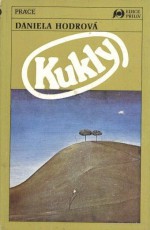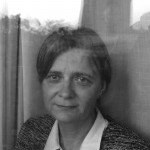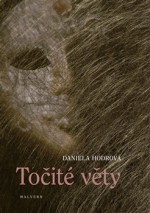Literary theorist, poet and prose writer, translator. Winner of the State Award for Literature (2011), Franz Kafka Prize (2012) and Magnesia Litera for best book of the year (2016). Her books have been published in a number of languages including English, German, French, Bulgarian and Polish. She was born in Prague on 5 July 1946.
Daniela Hodrová
In Praise of Curling Up: Essays on the Poetics of Transience
Chvála schoulení: Eseje z poetiky pomíjivosti
| Title | Publisher | Year | Selected published translations | Awards |
|---|---|---|---|---|
| What is revealed; Essays about Adriena Šimotová (Co se vyjevuje; Eseje o Adrieně Šimotové) | Malvern | 2015 | ||
| Spiral sentences (Točité věty) | Malvern | 2015 |
2016 Magnesia Litera – Book of the Year |
|
| The Novel of Initiation (Román zasvěcení) | Malvern | 2014 | ||
| In Praise of Curling Up: Essays on the Poetics of Transience (Chvála schoulení: Eseje z poetiky pomíjivosti) | Malvern | 2011 | ||
| Invocation (Vyvolávání) | Malvern | 2010 |
2011 State Award for Literature |
|
| I See a City... (Město vidím...) | Pavel Mervart | 2009 | PL | EN | IT | FR | |
| The Sensible City (Citlivé město) | Akropolis | 2006 | ||
| Comedy (Komedie) | Torst | 2003 | ||
| City of Torment (Trýznivé město) | Hynek | 1999 | ||
| Lost Children (Ztracené děti) | Hynek | 1997 | ||
| Places with a Secret (Místa s tajemstvím) | Koniasch Latin Press | 1994 | ||
| Perun’s Day (Perunův den) | Hynek | 1994 | ||
| The Novel of Initiation (Román zasvěcení) | H+H | 1993 | ||
| I See a City... (Město vidím...) | Euroslavica | 1992 | PL | EN | IT | FR | |
| A Kingdom of Souls (Podobojí) | Severočeské nakladatelství | 1991 | HU | EN | IT | PL | DE | FR | |
| Cocoons (Kukly) | Práce | 1991 | FR | DE | |
| Théta | Československý spisovatel | 1991 | FR | DE | |
| In Search of the Novel (Hledání románu) | Československý spisovatel | 1989 |

What is revealed; Essays about Adriena Šimotová
Co se vyjevuje; Eseje o Adrieně Šimotové

The Novel of Initiation
Román zasvěcení
In Praise of Curling Up: Essays on the Poetics of Transience
Chvála schoulení: Eseje z poetiky pomíjivosti

The Sensible City
Citlivé město

Comedy
Komedie

City of Torment
Trýznivé město

Lost Children
Ztracené děti

Places with a Secret
Místa s tajemstvím

Perun’s Day
Perunův den

The Novel of Initiation
Román zasvěcení

Cocoons
Kukly

Théta

In Search of the Novel
Hledání románu
| Award | Year | Country |
|---|---|---|
| Magnesia Litera – Book of the Year | 2016 | Česká republika |
| Franz Kafka Prize | 2012 | Česká republika |
| State Award for Literature | 2011 | Česká republika |
Praise
It would be a shame to be afraid of Daniela Hodrová. With her prose, the reader is plunged into a pleasant, stationary timelessness. For the writer, capturing the feelings of the characters is much more important than strictly observing the ticking away of the hours. In this respect, and in others, she resembles the English writer Virginia Woolf, who found inspiration in another noisy European metropolis, London.
—Klára Kolářová
Reflex
She graduated in Czech, Russian and French. She worked as an editor at Odeon and in the department of literary theory at the Czechoslovak Academy of Science’s Institute for Czech Literature, which she headed for a number of years. Her works range from fiction to literary-science essays and she writes for discerning readers. Each of her novels expands and elaborates upon her research from previous works.
She published her first poems in magazines in the sixties, and her first book was the literary-science work Hledání románu (In Search of the Novel), which builds on her earlier theoretical works in which she explored the boundaries, limits and possibilities of the novel. Her most important books include Román zasvěcení (The Novel of Initiation, H+H, 1993) and the trilogy Trýznivé město (City of Torment): Podobojí (A Kingdom of Souls), Kukly (Chrysalides/Masks), Théta (Theta, Hynek, 1999), in which she wanders through Prague across space and time; as well as literary and historical references, here she deals with the death of those close to her, especially her two husbands.
The novel Komedie (Comedy, Torst, 2003) follows on from this trilogy. Here the Olšany Cemetery, which the author lived opposite as a child, became the site for the author’s encounters with people from her life. In a similar vein is Vyvolávání (Invocation, Malvern, 2010): “Vyvolávání is a text which cannot easily be categorized in terms of genre. We certainly cannot speak of a traditional novel – the narrative element plays a far from central role and the reader cannot expect a single, unified story. Here the genre of the novel blends with others and the text can also be described to some extent as an essay or even a memoir. The usual storyline is missing and is replaced by a sort of colourful mosaic which is composed of smaller units – short tales, scenes or just thoughts and memories captured in a word,” writes Ladislav Nagy on the iLiteratura.cz website. Daniela Hodrová’s latest prose work is Točité věty (Spiral Sentences, Malvern, 2014), in which the author again thematizes the novel, creation and death – now the loved ones she has lost include the artist Adriena Šimotová and the writer Bohumila Grögerová.
From her essays and theoretical works it is worth mentioning the collections Poetika míst (The Poetics of Places, H+H, 1997) in which, together with her co-authors, she deals with important places in 19th- and 20th-century literature, such as the castle, cottage, pub, school and educational space, prison, church and religious space, factory, tower or bedroom in Czech literature, which she compares with the context of world literature. Kniha …na okraji chaosu… (A Book…on the Brink of Chaos…, Torst, 2001) is another work by Hodrová and her colleagues; across almost nine hundred pages they analyze the landscape of the modern European novel. The essays on the poetics of ephemerality Chvála schoulení (In Praise of Curling Up, Malvern, 2011) examine the spiritual horizons of the contemporary western individual. The lengthy “essays on mythopoeia” with the title Citlivé město (The Sensible City, Akropolis, 2006) view Prague as a benign labyrinth similar to a mandala.






